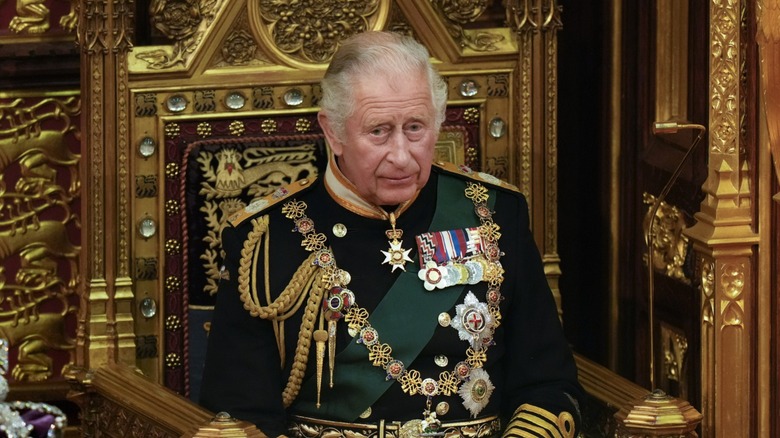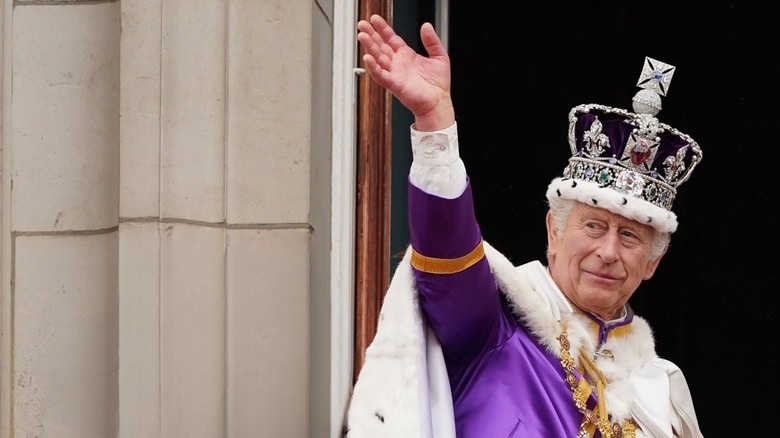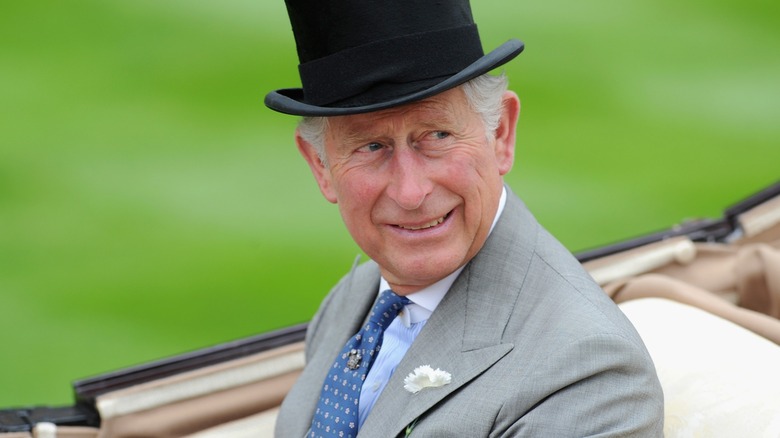What Is King Charles' Last Name And What Does It Mean?
If you aren't sure what King Charles III's last name is, you aren't alone. He's most often referred to as simply King Charles, or Prince Charles before his coronation. However, he does have a surname, and it's a mouthful: Mountbatten-Windsor. The name was created by his late parents, Queen Elizabeth II and Prince Philip, and it's a combination of their two last names.
As for the Windsor name, it was originally chosen by King George V in a break from tradition. According to the official royal family website, royal family members didn't have surnames, but instead, operated under their house name or dynasty. In 1917, King George V decided a change was in order as anti-German attitudes increased following World War I. The royal family's house name changed from the House of Saxe-Coburg-Gotha to the House of Windsor, in honor of the castle of the same name. Windsor also became the official last name for British royals descended from the male line of Queen Victoria, except, of course, when women of the family got married and took a new name.
However, Queen Elizabeth and Prince Philip wanted a different name for their line of descendants. They combined Windsor with the last name Philip chose when he became a U.K. citizen: Mountbatten, a family name from his mother's side.
Titled royals don't often use last names anyway
Just because King Charles III has a last name doesn't mean he has to use it. That's just one perk of being king along with the list of royal rules Charles no longer has to follow. However, you don't have to be on the throne to skip a surname if you're in the British royal family. According to the official royal family website, any his/her royal highness with a prince or princess title doesn't need to use their last name, except for things such as marriage licenses.
King Charles' birth name isn't just Charles Mountbatten-Windsor, however. His full name excluding the surname is Charles Philip Arthur George, which is likely not the kind of name you'd see on a vanity license plate or a souvenir mug.
Interestingly, Charles' sons — William, Prince of Wales and Prince Harry — didn't use Mountbatten-Windsor as their surnames during their time at school and in the military. Instead, they used the last name Wales. That was because Charles was Prince of Wales before William got the title. (William Wales was a pretty normal name compared to some of the other cheeky nicknames for Prince William).
Why didn't King Charles change his name when he ascended to the throne?
Not every royal uses their given name when they ascend to the throne. For instance, King George VI — Queen Elizabeth II's father and King Charles III's grandfather — was born Albert Fredrick Arthur George. Charles could have easily gone by one of his other names (Philip, Arthur, or George) if he wanted. He didn't, and Keith Roy from the Monarchist League of Canada spoke to Global News Canada about presumably why. "He's quite comfortable in his own skin, his own name and his own identity," Roy said. He added, "His own reputation is strong enough that he can maintain his name."
The previous two King Charles' have storied histories — one was beheaded, and the other had a penchant for scandal. That didn't stop King Charles III from keeping the name, and Roy explained how in the modern times, a royal choosing to change their name would be odd.
"We live in a different era where the public feels much more connected to the individuals in the Royal Family," Roy said. "And therefore, a name change would feel weird both to the individual and to the public." Charles was already 73 when he became king, and 74 when he had his coronation, so it makes sense that he decided to stick with that name. However, his reign hasn't been an easy one as the year following Charles' coronation was rather tragic.


